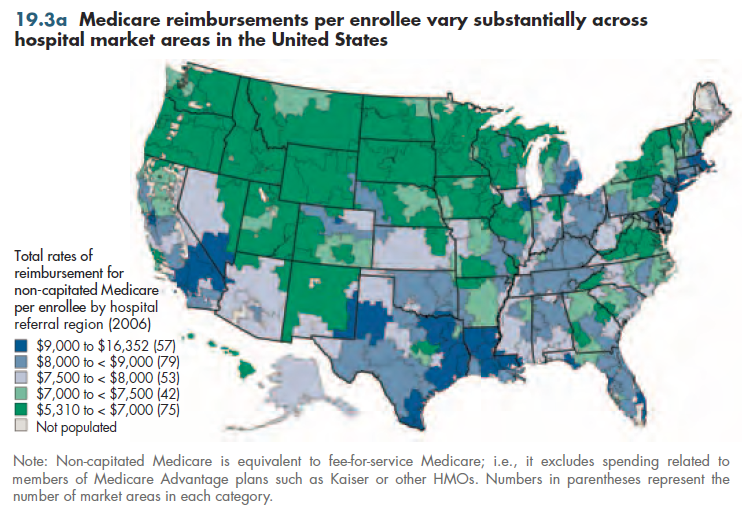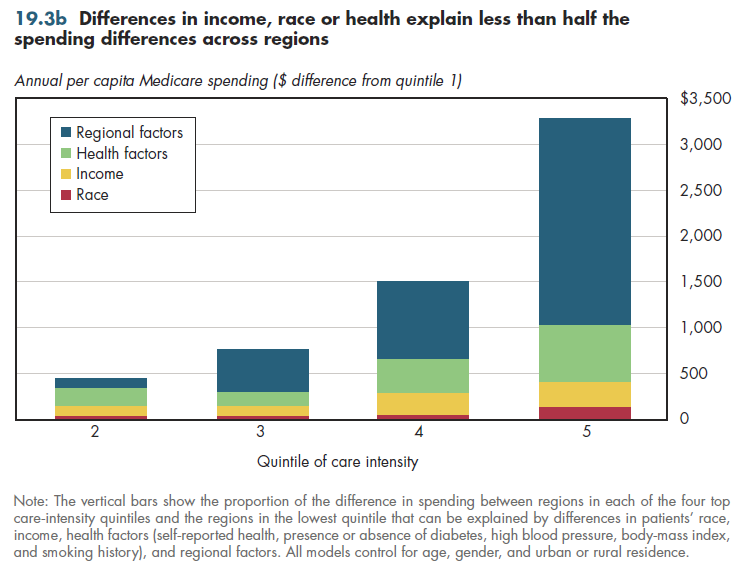Download PowerPoint versions of both figures.
Inside Collection (Book): American Health Economy Illustrated
19.3 Medicare Spending & Spending Growth Vary Substantially across Geographical Areas
Summary: In Medicare, there are sizable geographic variations in spending and spending growth. Only a relatively small part of geographic variations in Medicare spending can be explained by differences in health status, income, or race. Most of the difference relates to "practice style."
There is almost a three-to-one difference in Medicare spending per enrollee between hospital markets with the least amount of spending and those with the highest (figure 19.3a). These enormous differences by location are not a new phenomenon, having been observed for decades. Many factors contribute to these differences, but they are not entirely well understood. Because Medicare eligibility and benefits are the same across the entire country, these factors cannot explain the large geographic variations in Medicare spending.

The availability of resources contributes to these spending differences. Geographic areas that have more physicians or hospital beds relative to the population tend to spend more, which in turn can attract more physicians. Differences in organizational and physician decision-making, which some characterize as practice style, also play a critical role in these financial differences. Many discretionary decisions, such as whether a patient warrants admission to the hospital, hospital lengths of stay, whether a patient is referred to a specialist, the ordering of various tests, or how often to see chronically ill patients, collectively drive much of the variation.
Medicare's fee-for-service system also plays a role. Geographic variations in Medicare spending are not always replicated in private health plans, in which most members are in some form of managed care. Increases in Medicare spending also vary geographically. Areas that have high spending growth are not generally areas with the highest spending levels. Thus, Medicare's geographic variations might decrease over time.
Differences in income, race, and health status play a relatively minor role in explaining the geographic variations in Medicare spending (figure 19.3b). Income can explain health-spending differences across countries and individual states. However, income explains little of the difference between Medicare regions that spend more compared with those in the bottom 20 percent of spending.

Downloads
References
- Fisher E, D Goodman, J Skinner and K Bronner. Health Care Spending, Quality, and Outcomes. Dartmouth Institute for Health Policy and Clinical Practice. Hanover NH. February 27, 2009.
- Sutherland JM, ES Fisher and JS Skinner. Getting Past Denial—The High Cost of Health Care in the United States. New England Journal of Medicine 2009; 361:1227-30.
Collection Navigation
- « Previous module in collection 19.2 Geographic Differences in Broad Health Outcomes Are Associated with Health Spending
- Collection home: American Health Economy Illustrated
- Next module in collection » 19.4 US Health Spending per Capita Is Not Far from Expected
Content actions
Give feedback:
Download:
Add:
Reuse / Edit:
Twin Cities Campus:
- © 2012 Regents of the University of Minnesota. All rights reserved.
- The University of Minnesota is an equal opportunity educator and employer. Privacy
- Last modified on Sep 24, 2013 3:30 pm -0500









